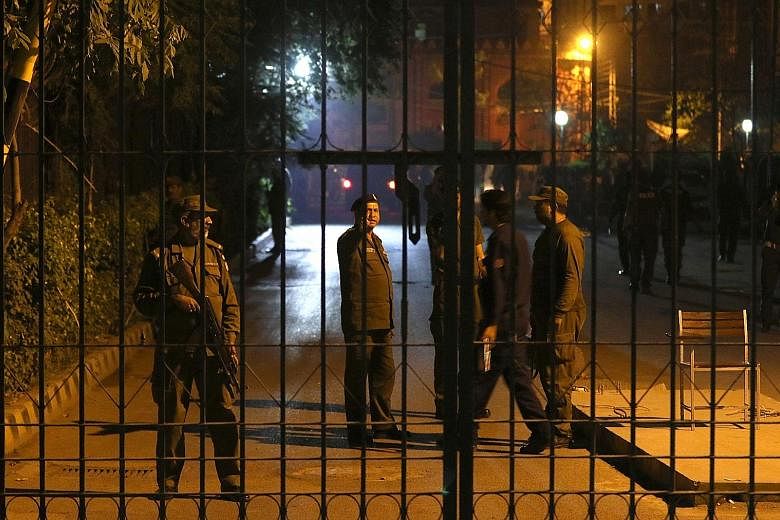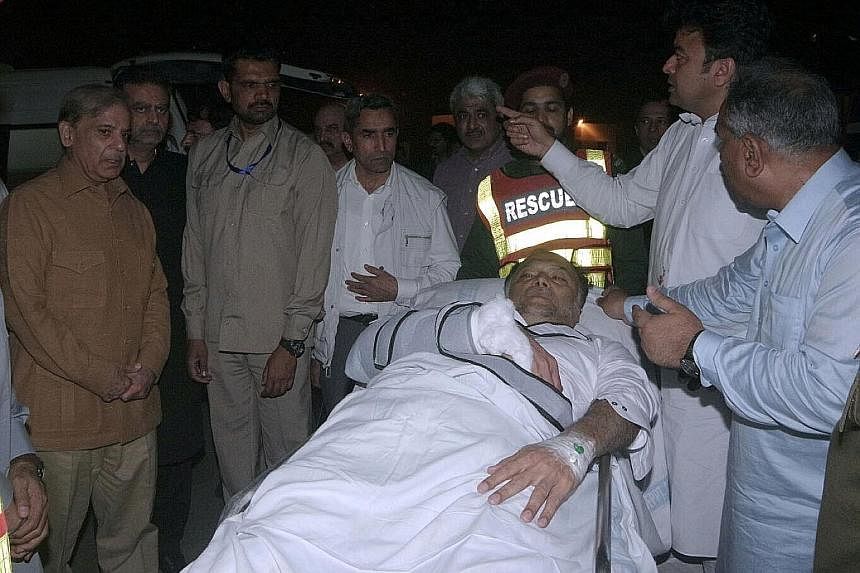LAHORE • Pakistan's interior minister was recovering in hospital yesterday after being shot in a suspected assassination attempt possibly linked to blasphemy, with the attack seen as an ominous sign for security ahead of nationwide elections.
Mr Ahsan Iqbal, 59, was shot in the right arm as he prepared to leave a public meeting in his constituency in Punjab province late on Sunday.
A man identified by police only as "Abid" and said to be in his early 20s was wrestled to the ground by officers and bystanders as he was preparing to fire a second shot. He has been taken into custody.
Police are still investigating the attack. But local deputy commissioner Ali Anan Qamar told Agence France-Presse that the shooter said he was inspired by a controversy last year in which a small amendment to the oath that election candidates must swear had to be hastily reversed after it was linked to blasphemy.
The row sparked a three-week sit-in last November by a previously little-known Islamist group, which paralysed the capital.
That demonstration ended when the government capitulated to the protesters' demands - including the ousting of the federal law minister - in a deal brokered by the military.
At the time, many Pakistanis and analysts warned that a dangerous precedent had been set in which fringe groups could bend the state to their will by citing blasphemy, a highly inflammatory charge in the conservative Muslim country.
Mr Iqbal, a champion of Pakistan's much-persecuted religious minorities, pushed for a negotiated settlement to the controversy. He has previously condemned hate speech against groups such as the Ahmadis, an Islamic minority sect at the centre of the dispute.
After the shooting, he was rushed first to a local hospital and then airlifted to Lahore, where video footage released by his ruling Pakistan Muslim League-Nawaz party (PML-N) showed him being lowered from a helicopter on a stretcher, his eyes open as he responded to questions.
Doctors performed surgery on him until the early hours, said Mr Shafqat Waseem Chaudhry, one of the five-member medical team responsible for treating the patient.
"He is stable now. But he will remain in the (intensive care unit) for two days," he said.
The attack was swiftly condemned by the international community as Pakistanis voiced fears that it represented an attempt to weaken democracy ahead of the federal elections, widely expected to be held late this summer.
Mr Ziauddin Yousafzai, father of Pakistani Nobel Peace Prize winner Malala Yousafzai, tweeted that he "strongly condemned" the attack, calling it a "bad omen for upcoming general elections that are supposed to be free, fair and transparent".
Security analyst Amir Rana told AFP that the shooting of the minister nominally in charge of security in a country that has long grappled with militancy was a "serious" development.
The vote will only be Pakistan's second-ever democratic transition, and with the PML-N in disarray since Prime Minister Nawaz Sharif was ousted by the Supreme Court over graft allegations last summer, there has been growing speculation it could be delayed.
Blasphemy can be punishable by death under controversial Pakistani legislation, with even unproven allegations sparking mob lynchings and murders.
AGENCE FRANCE-PRESSE


